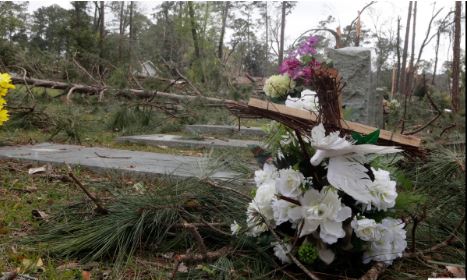Potential Tornadoes Headed for Georgia

Damage caused by tornadoes that swept through the southeast, injuring dozens. (Photo by Alicia Devine.)
March 25, 2019
On March 9, catastrophic tornadoes hit major cities in Alabama, Florida and even parts of Georgia. These tornadoes caused massive injuries and killed at least 23 people in total. They were caused by severe weather outbreaks in the neighboring states and continued to bring rainy weather in the following days after the tornados hit. According to the National Weather Service, two separate tornadoes hit Lee County on Sunday, March 9 and have left behind destructive damage to property.
“I cannot recall, at least in the last 50 years, maybe even longer than that, a situation where we have had this loss of life that we experienced today,” Lee County Sheriff Jay Jones told WRBL-News 3. On March 6, government surveys confirmed that 34 tornadoes in total have struck the southeastern states since the Sunday of March 3. Fourteen tornadoes have spawned in Alabama and 14 more across Georgia. Although Forsyth County was not directly affected, winds could still be felt miles away from the disastrous scene. People were being pulled up from under debris through the night as fatalities continued to rise.
As spring approaches, tornado season in Florida is coming fast, bringing storms with wind speeds as high as 140 mph. Counties around the southeast area such as Jefferson, Grady, Geneva, Clay and many more have been drastically affected by these tornadoes. Which range from F1 to F3 on the EF scale (a measure of tornadoes based on their wind damage)
Georgia experienced some tornado damage early this March, particularly in the most tornado-prone county in all of Georgia, Fulton county. Although not many tornadoes have hit this year, a tornado which hit on Oct. 10, 2018 marked the 34th tornado to touch down in Georgia since 1950, according to www.ajc.com. With tornadoes potentially striking Georgia again, safety precautions must be enforced in order to keep everyone safe. North Forsyth High School, along with all the other schools in Forsyth County, has implemented a procedure in the case of an emergency tornado hitting nearby. However, students may not know exactly what to do.
Jeshua Bernal, a junior at North Forsyth, ironically commented, “You put a book over your head and hope the building doesn’t collapse on you.”
“Get under a desk if you’re in a fully enclosed room,” Dylan Bryson, another junior, added
Tornado drills across Georgia all follow the same procedure: Staying on the lowest story of the school, reaching a designated safe area, and crouching with their hands over their heads until the drill is over. Although these students may not be entirely wrong, it is best to continue to practice tornado drills so students across Georgia and other states know what to do when a possible tornado is nearby.



